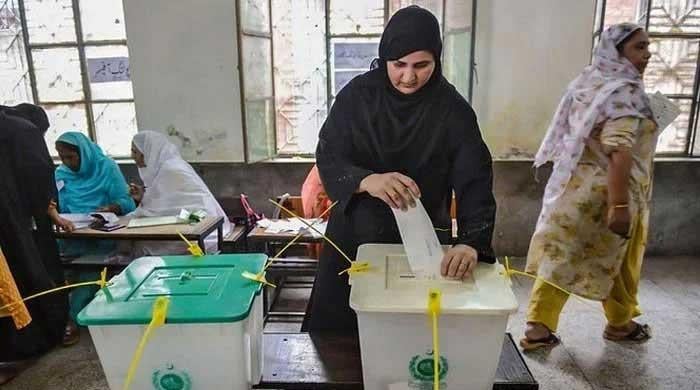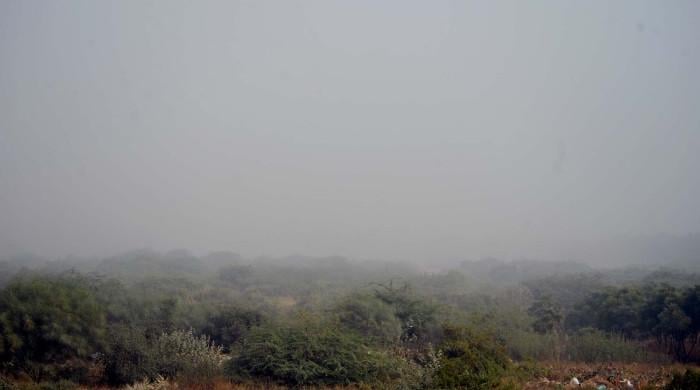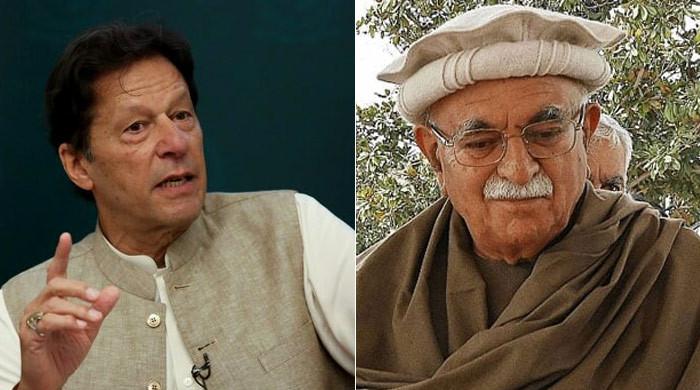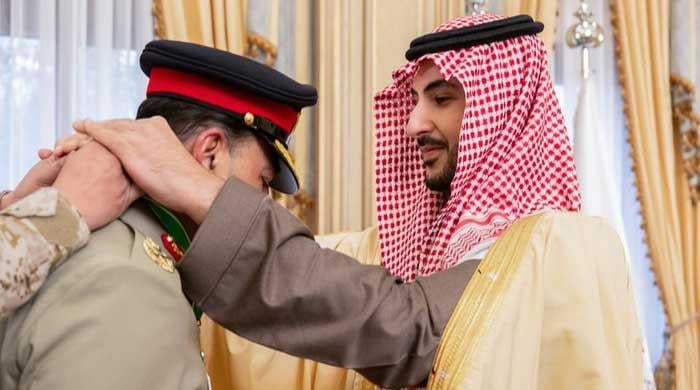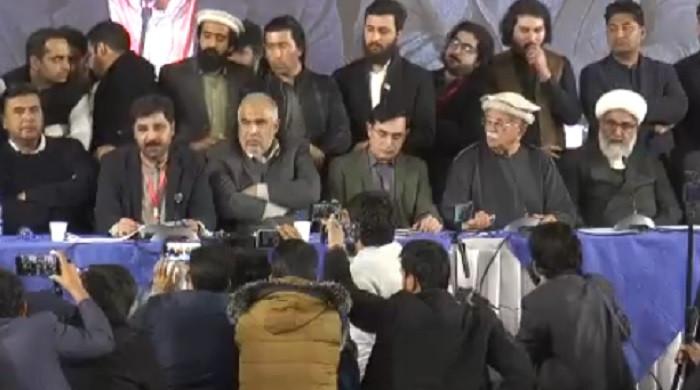Army Act applies to civilians: CJP Bandial
"Provoking serving army officer for conspiracy against national security was a serious crime," CJP remarks
June 23, 2023

- Top judge says army can request ATC for custody of civilians: CJP
- Punjab govt submits report sans details on suspects in military custody.
- CJP says SC will try to issue a verdict by June 27.
ISLAMABAD: Chief Justice of Pakistan (CJP) Umar Ata Bandial remarked on Friday that Pakistan Army Act applied to civilians.
A seven-member bench — comprising CJP Bandial, Justice Ijazul Ahsan, Justice Mansoor Ali Shah, Justice Muneeb Akhtar, Justice Yahya Afridi, Justice Ayesha Malik, and Justice Mazahir Ali Naqvi, was hearing a set of petitions trials of civilians in military courts.
The government had decided to try civilians under army laws after enraged protesters belonging to the Pakistan Tehreek-e-Insaf (PTI) vandalised army installations following the arrest of their party chief.
The petitions, separately filed by PTI Chairman Imran Khan, former chief justice Jawwad S Khawaja, legal expert Aitzaz Ahsan, and five civil society members including Piler Executive Director Karamat Ali, have requested the apex court to declare the military trials unconstitutional.
During the hearing, CJP Bandial, while citing Justice Shah, said that the army is directly affected related to the matters like national security.
"Provoking serving army officer for conspiracy against national security was a serious crime," CJP remarked, adding that reviewing Army Act clauses was not needed.
"It wasn't correct to say that the civilians cannot be tried in the military courts ever. A civilian is tried in the military court if he incites the army for treason."
It needs to be seen what method was adopted to bring civilians under the jurisdiction of military courts, and on which basis the anti-terrorism court (ATC) sent the cases to the military courts, he added.
A different petition
At the outset of the hearing, petitioner Karamat Ali’s lawyer — Faisal Siddiqui — took to the rostrum and maintained that he had submitted a written statement.
"My petition is different from others. I have not challenged the Army Act and I do not contend that the civilians cannot be tried in military courts," the counsel stated.
He said that the military trials of civilians had taken place earlier as well.
At this, Justice Shah inquired why hadn't he challenged the Army Act.
Responding to the query, he said that the trial of "favourite persons" or specific civilians under military laws was wrong and unconstitutional.
The counsel stated that he did not say that any clause of the Army Act was illegal, adding that a verdict against military courts in 1998 did not bring the Army Act under question.
At this, Justice Ayesha asked what principles had been set regarding the Army Act in other cases and what was the basis on which the civilians were being tried under the said law.
Meanwhile, Justice Shah observed that "a trial is conducted under the Army Act and Official Secrets Act when it comes to national security".
The judge then told the lawyer to give arguments on the law if he hadn't challenged the Army Act.
Punjab govt's report
As per a report submitted by Punjab government, 81 women had been detained following the May 9 mayhem. Of these, 42 have been released on bail, while the remaining 39 are on judicial remand.
Moreover, the report stated that while 3,050 suspects had been found involved in incidents of vandalism following the PTI chief's arrest, 2,258 detention orders were issued under the Maintenance of Public Order (MPO) Act. Of these, only 21 are currently in jail.
Furthermore, the report added that 1888 people were arrested in the 51 cases registered under the Anti-Terrorism Act (ATA) on May 9. Of these 1888, 108 accused are on physical remand while 1247 are in judicial custody.
Additionally, the identification parade of 33 suspects was conducted while 232 were released on bail. At the same time, 500 people were declared innocent and released.
According to the report, 247 cases were registered under laws other than the ATA. In these cases, 4,119 people were arrested, of whom 86 accused are in physical remand, while 2,464 are in judicial custody.
Moreover, the identification parade of 368 suspects was carried out, and 1201 were acquitted. The report shared that 3,012 people were released on bail in these cases.
Justice Naqvi remarked that the report submitted by the Punjab government did not contain the provisions of the Official Secrets Act,
He asked at which point the provisions of the Official Secrets or Army Act had been added to the cases, and wondered whether a commanding officer could ask for suspects to be handed over if provisions of the Official Secrets Act were not included in the FIR.
Meanwhile, Justice Shah inquired on what basis the army concluded that these suspects committed the crime, while Justice Ayesha asked on what ground the case can be registered under Army Act or Official Secret Act.
At this, Siddiqui said that he was contending the same that the army cannot request the custody of civilians.
Army can request ATC for custody of civilians: CJP
During the hearing, CJP Bandial remarked that the army can request the anti-terrorism courts to get the custody of civilians for their trial under military laws.
"It’s common sense that crimes under the Official Secrets Act are to be determined by the army itself and it can request anti-terrorism courts seeking the custody of civilians for trials under army laws," the chief justice remarked.
However, he noted that there was no solid reasoning provided by the military. "We will ask this from Attorney General Mansoor Usman Awan."
At this point, the hearing was adjourned for 15 minutes.
When the hearing resumed, lawyer Siddiqi maintained that the civilian cannot go to the military courts.
"Civilians' trial is conducted in the civil courts or can be conducted in the military courts in case of extremely extraordinary circumstances," he added.
He went on to say that a thorough inquiry should be held before charging the civilians. There is a legal option to try the May 9 suspects in other courts, he added.
Justice Ayesha then asked the lawyer to tell the "extraordinary circumstances" under which the civilians can be tried in military courts. She also wondered if the military courts can try the civilians under Official Secret Act within a certain limit.
Justice Ayesha said that the issue here was whether the civilians' crimes fall under the Official Secret Act.
At this, Siddiqi informed the court that the offences defined in the Anti-Terrorism Act (ATA) are totally different.
'Federal govt can solve military court controversy'
Justice Ahsan remarked that the federal government could resolve the controversy related to the military and civil courts.
Ali's lawyer wrapped up his arguments by saying that “the ATA applies in case of attacks on vital installations”.
After this, ex-CJP S Khawaja's lawyer started his arguments.
He said that the purpose of the Army Act was to maintain discipline in the armed forces.
The lawyer then requested the court to form a larger bench, adding that it was an important case and would set an example.
"Civilians' court-martial is unconstitutional when the civil courts are working," Khawaja's lawyer stated.
He said that his plea did not support any political party or any attack on a military installation. Instead, it was about basic human rights.
The CJP inquired which fundamental rights given in the Constitution would be affected by trial in military courts.
At this, the lawyer maintained that Articles 9, 10 and 25 would be affected.
He said that the verdict of the 21st constitutional amendment did not prevent a seven-member bench from quashing Section 2D-1 of the Army Act.
"The court can constitute a larger bench if it thinks its hands are tied by the 21st amendment verdict," he added.
At this, Justice Ahsan remarked that the court stated in the 21st Amendment verdict that the military courts were for certain circumstances.
"The words like 'war conditions' were used in the verdict," he added.
After this, the court adjourned the hearing till 1:30pm.
Take govt's stance on lawyers, journalists' arrests: CJP
Presenting his arguments after the resumption of the hearing, AGP Awan maintained that three questions had been asked to him in yesterday's verdict.
He informed the court that no suspect was in Islamabad police custody but four people are in KP police custody. He said that about 172 people were in judicial custody in Sindh while 70 people have been granted bail.
"As many as 117 people are in custody under 3 MPOs in Sindh, 102 in military custody. No woman, journalist or lawyer is in military custody," he told the court.
The CJP inquired if there is any policy for journalists and lawyers. At this, the AGP replied that the federal government's stance is clear that no journalist or lawyer will be arrested in connection with the May 9 events.
"Identification parade is being conducted, if someone isn't involved in the events, then they will not be arrested."
When asked how many children were arrested, AGP Awan replied that no child is in military custody. "However, one child is in military custody in KP and his age is being ascertained. If he is under 18 then he will be released."
At this, CJP Bandial directed the AGP to contact the caretaker governments and take their stance regarding lawyers and journalists.
The court then postponed the hearing of the petitions on June 26 (Monday) till 9:30am.
The CJP further said that the hearing will resume from advocate Salman Akram Raja's arguments, adding that the court will try to issue a verdict on this case by Tuesday (June 27).





